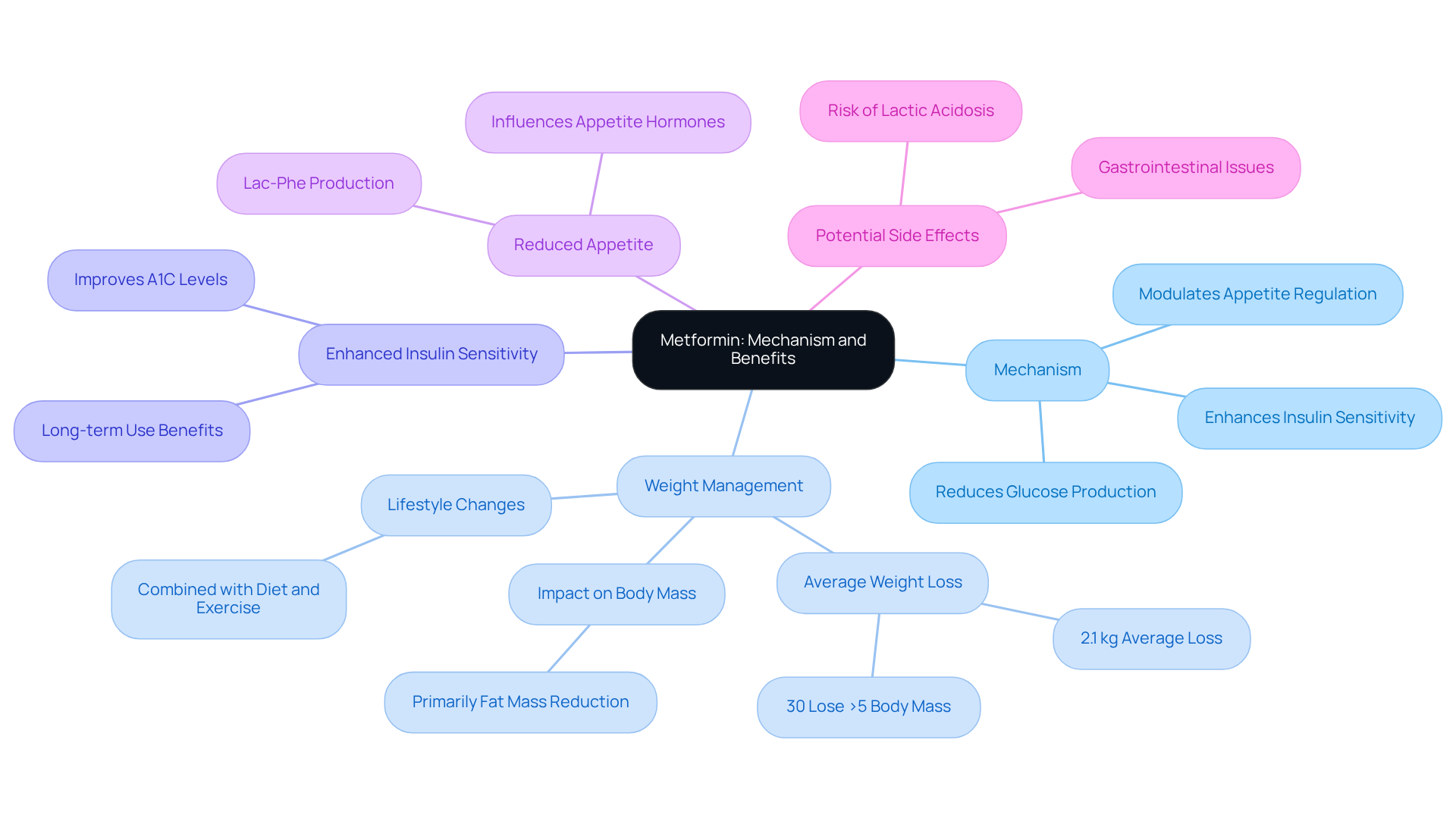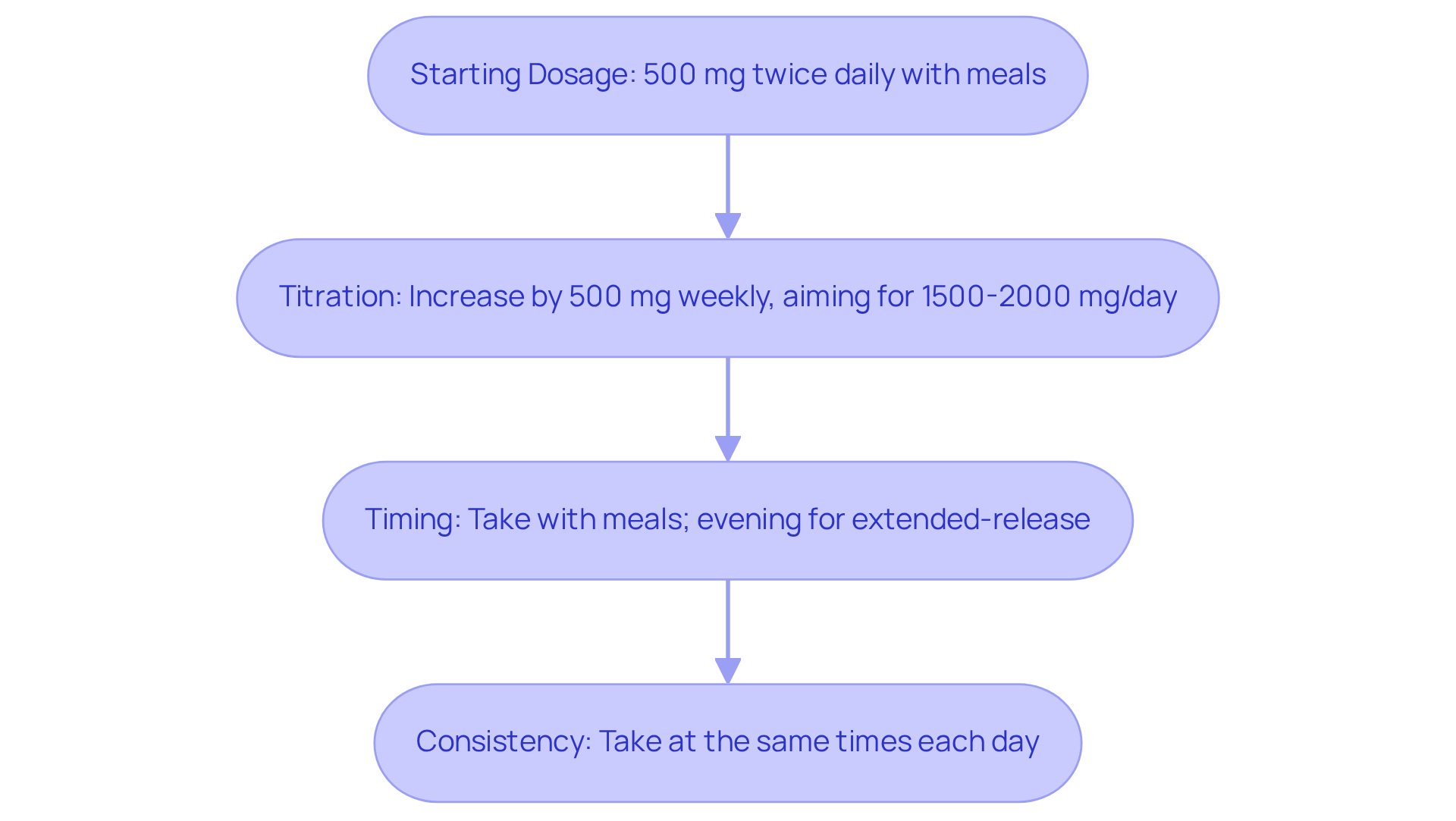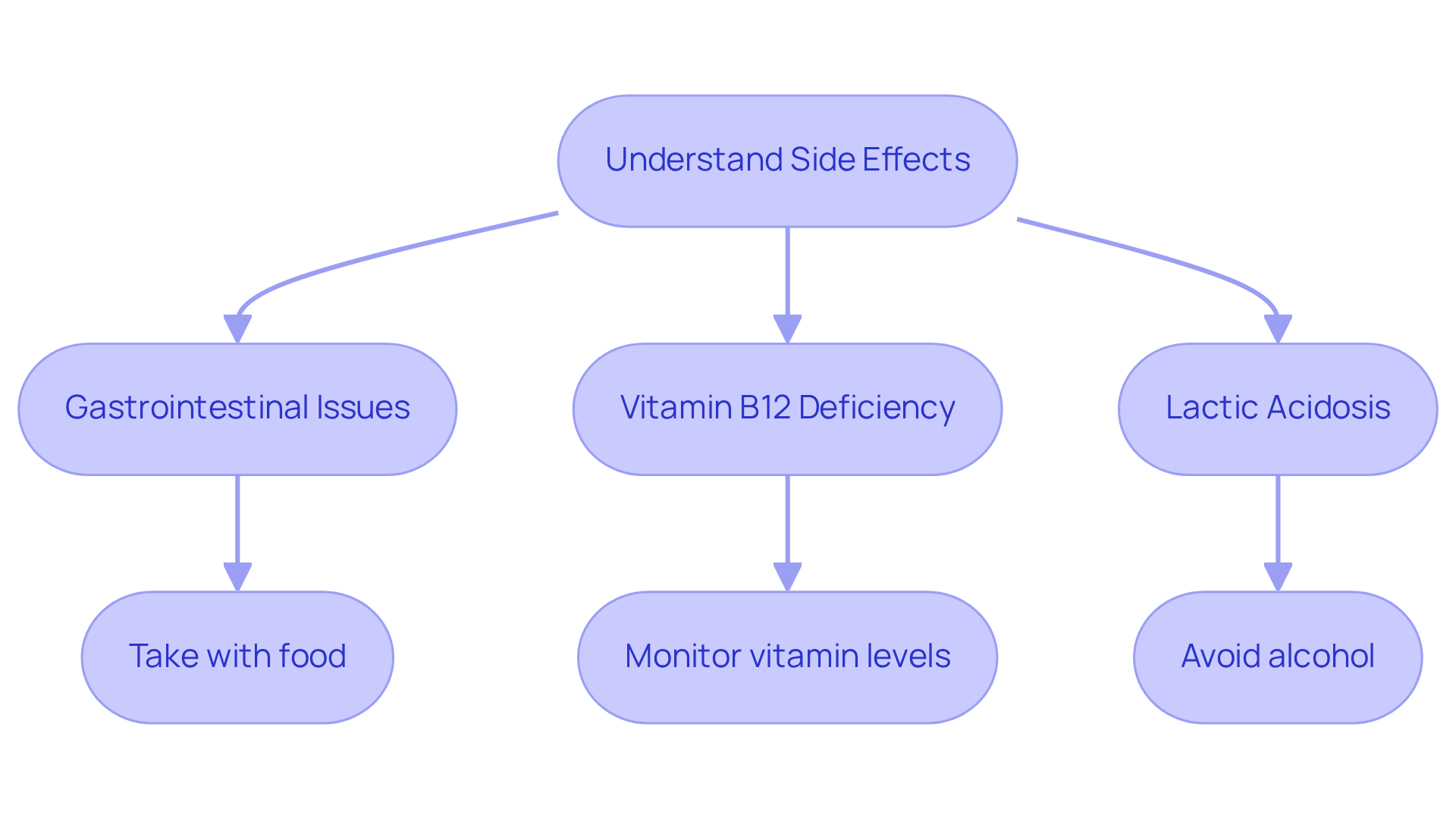Overview
This article highlights the optimal timing strategies for taking Metformin, particularly in enhancing your weight loss efforts. It’s important to understand that taking Metformin with meals can significantly help in minimizing gastrointestinal side effects and improving appetite control. These factors play a crucial role in supporting effective weight management. Studies have shown that users often experience modest weight loss, which can be a comforting reassurance as you navigate your journey. Remember, we’re here for you, and together, we can achieve your goals.
Introduction
Understanding the complexities of weight management can often feel overwhelming, especially for those navigating the challenges of type 2 diabetes. Metformin, primarily recognized for its ability to lower blood sugar, has emerged as a potential ally in the journey toward weight loss. It offers a glimmer of hope by enhancing insulin sensitivity and helping to regulate appetite. However, the effectiveness of this medication significantly depends on the timing of its administration—this crucial detail can truly make a difference in achieving your desired results.
So, what strategies can you employ to optimize your use of metformin for weight loss? How can you effectively navigate the potential challenges that may arise with this treatment? Together, we can explore these questions and find ways to support your journey toward better health.
Understand Metformin: Mechanism and Benefits
Managing type 2 diabetes can feel overwhelming, but there’s hope. The medication is an oral treatment that is primarily recommended for controlling this condition and is now recognized as an essential component of Minimal’s comprehensive reduction programs, starting at just $99.99/month. Its key functions include reducing glucose production in the liver, enhancing insulin sensitivity, improving peripheral glucose uptake, and lowering blood sugar levels. Recent studies have even highlighted additional benefits of this medication for body mass management, particularly its role in appetite control.
Weight Management: Have you ever felt frustrated with weight loss? Research suggests that understanding when to take metformin for weight loss can help individuals experience modest weight loss, especially when paired with lifestyle changes. In a meta-analysis, participants on this medication lost an average of 2.1 kg, with around 30% shedding more than 5% of their body mass within the first year. This highlights how Metformin can effectively support your personalized health journey.
Enhanced Insulin Sensitivity: By improving the body’s response to insulin, this medication plays a vital role in regulating blood sugar levels and enhancing long-term A1C levels, which is crucial for effective fat loss. Long-term use has shown an average reduction of 6.2% compared to placebo, underlining its metabolic advantages and contribution to overall health enhancement.
Reduced Appetite: Have you noticed how appetite can impact your weight loss efforts? This medication influences appetite-regulating hormones, particularly through the production of lac-phe, a molecule linked to decreased hunger after exercise. This leads to reduced caloric intake, further supporting your slimming endeavors.
It’s important to note that while this medication can assist in weight management, understanding when to take metformin for weight loss is crucial, and results can vary from person to person. Understanding when to take metformin for weight loss is essential for anyone considering it as part of their weight reduction strategy. Not only can it help with weight loss, but it also promotes overall metabolic health.
However, we must be mindful of potential gastrointestinal side effects, such as stomach discomfort, nausea, diarrhea, and decreased vitamin B12 levels with prolonged use. There is also a rare but serious risk of lactic acidosis if not used correctly. Keeping these factors in mind will help ensure a safe and informed approach to your wellness journey. Remember, together, we can achieve your goals, and we’re here to support you every step of the way.
Identify Eligibility: Who Should Consider Metformin?
Metformin is a medication that can offer hope to those facing challenges with weight management and diabetes. If you are navigating the complexities of type 2 diabetes, you may find that understanding when to take metformin for weight loss can help you manage your blood sugar levels. This medication is designed to improve insulin sensitivity and reduce glucose production in the liver, making it a cornerstone in diabetes management. In fact, individuals participating in the Diabetes Prevention Program (DPP) experienced an average weight reduction of 2.1 kg while on this medication. Additionally, it can help decrease appetite and cravings for high-calorie foods, further supporting your weight loss journey.
For those diagnosed with prediabetes, especially if your BMI is 35 or greater, knowing when to take metformin for weight loss may be a beneficial option to help prevent the progression to type 2 diabetes. Research indicates that early intervention with this medication can lead to a significant reduction in the risk of developing diabetes, with a 31% decrease in incidence compared to a placebo. This early action can be a crucial step in taking control of your health.
If obesity is a concern, it’s important to understand when to take metformin for weight loss, even if you do not have diabetes. This is particularly important for individuals with additional risk factors, such as hypertension or dyslipidemia. Studies have shown that understanding when to take metformin for weight loss can result in moderate weight reduction and help prevent weight gain in those receiving antipsychotic treatments, with an average weight decrease of 3.27 kg noted in a meta-analysis. However, it’s important to be aware that some individuals may experience gastrointestinal discomfort, such as nausea or diarrhea, especially during the initial weeks of treatment.
Age is another factor to consider. Generally, adults aged 10 and older can take this medication, but if you are an older adult, it’s essential to consult your healthcare provider for personalized advice, as age-related factors may influence the appropriateness of this treatment.
Before embarking on this medication, we encourage you to have a conversation with your healthcare provider. This step is vital to assess your individual health conditions and determine your eligibility. By doing so, you ensure that the treatment aligns with your overall health strategy and addresses any potential risks or contraindications. At Minimal, we emphasize a comprehensive approach to reducing body mass, integrating personalized fitness and nutrition guidance alongside medication. As Dr. Schmidt wisely notes, “This medication is typically well-accepted, but some individuals encounter adverse reactions, most frequently digestive problems.” Remember, we’re here for you, and together, we can achieve your goals.
Implement Metformin: Dosage and Timing Strategies
To effectively implement Metformin for weight loss, it’s important to consider some dosage and timing strategies that can truly support your journey:
- Starting Dosage: Begin with an initial dose of 500 mg taken twice daily with meals. This approach helps to minimize any gastrointestinal side effects, making your experience more comfortable.
- Titration: Gradually increase your dosage by 500 mg each week, as your body tolerates it. Aim for an effective dose, which typically ranges between 1500 mg to 2000 mg per day. Remember, it’s all about finding what works best for you.
- Timing: It is important to know when to take metformin for weight loss, as taking it with meals is recommended to reduce gastrointestinal discomfort. If you’re using extended-release formulations, consider taking it with your evening meal to help maintain stable blood sugar levels overnight.
- Consistency: Try to take your medication at the same times each day. Establishing a routine can help you avoid missed doses and keep you on track.
By following these compassionate guidelines, you can significantly enhance your understanding of when to take metformin for weight loss to aid your efforts. Together, we can achieve your goals and make this journey a little easier.
Manage Risks: Understand Side Effects and Precautions
While this medication is generally well-accepted, it’s important to recognize that some individuals may experience adverse reactions. Understanding these side effects can empower you to manage your health effectively. Let’s explore some common concerns:
- Gastrointestinal Issues: Nausea, diarrhea, and abdominal discomfort can affect around 30% of users, especially when starting treatment. To help ease these effects, consider taking the medication with food. Many patients have found that understanding when to take metformin for weight loss has led to a more comfortable experience.
- Vitamin B12 Deficiency: Long-term use of this medication may decrease vitamin B12 absorption, potentially leading to fatigue and anemia. Regularly monitoring your vitamin levels is essential, particularly for those on the medication for extended periods. Research indicates that up to 10% of users might face this deficiency.
- Lactic Acidosis: Although rare, this serious condition can arise, particularly in individuals with kidney issues. It’s crucial to inform your healthcare provider about any kidney concerns before starting the medication. Additionally, excessive alcohol consumption increases the risk of lactic acidosis, so it’s wise to avoid alcohol while on this medication.
To manage these risks effectively:
- Regular Check-ups: Scheduling regular appointments with your healthcare provider can help you monitor your health and adjust your dosage if needed. This proactive approach can significantly reduce potential adverse reactions and ensure you achieve the best treatment outcomes.
- Lifestyle Changes: Embracing a balanced diet and consistent exercise can enhance the medication’s effectiveness and minimize side effects. Many patients have reported improved experiences by integrating these lifestyle changes. For instance, some have successfully managed gastrointestinal side effects by knowing when to take metformin for weight loss around meals.
By staying informed about these risks and taking proactive measures—like monitoring vitamin B12 levels and avoiding excessive alcohol—you can create a safer and more effective experience with Metformin. Remember, we’re here for you every step of the way, and together, we can achieve your health goals.
Conclusion
Understanding the optimal timing for taking metformin can significantly enhance its effectiveness in weight management, especially for those navigating the challenges of type 2 diabetes or prediabetes. This medication not only aids in controlling blood sugar levels but also offers potential benefits for appetite regulation and overall metabolic health. By integrating metformin into a comprehensive health strategy, individuals can more effectively navigate their weight loss journey.
Key insights from this guide highlight the importance of:
- Dosage
- Timing
- Eligibility for metformin use
Starting with a low dose, taking it with meals, and maintaining consistency can help minimize side effects while maximizing its benefits. Furthermore, recognizing who should consider metformin—such as those with obesity or prediabetes—empowers individuals to take proactive steps toward better health.
Ultimately, the journey to weight loss and improved health is multifaceted. By combining metformin with lifestyle changes and regular consultations with healthcare providers, individuals can create a safer and more effective treatment experience. Embracing this holistic approach not only fosters better health outcomes but also encourages a sustainable path toward achieving personal wellness goals. Remember, together, we can achieve your goals, and we’re here for you every step of the way.
Frequently Asked Questions
What is Metformin and what is its primary use?
Metformin is an oral medication primarily recommended for managing type 2 diabetes. It helps control blood sugar levels and is recognized as an essential component of Minimal’s comprehensive reduction programs.
How does Metformin work in the body?
Metformin functions by reducing glucose production in the liver, enhancing insulin sensitivity, improving peripheral glucose uptake, and lowering blood sugar levels.
Can Metformin aid in weight management?
Yes, Metformin can support weight management. Research indicates that individuals taking this medication may experience modest weight loss, especially when combined with lifestyle changes.
What are the average weight loss results for participants using Metformin?
In a meta-analysis, participants on Metformin lost an average of 2.1 kg, with approximately 30% losing more than 5% of their body mass within the first year.
How does Metformin enhance insulin sensitivity?
Metformin improves the body’s response to insulin, which helps regulate blood sugar levels and enhances long-term A1C levels, contributing to effective fat loss.
What impact does Metformin have on appetite?
Metformin influences appetite-regulating hormones, particularly through the production of lac-phe, which is linked to decreased hunger after exercise, leading to reduced caloric intake.
Are there any side effects associated with Metformin?
Yes, potential gastrointestinal side effects include stomach discomfort, nausea, diarrhea, and decreased vitamin B12 levels with prolonged use. There is also a rare risk of lactic acidosis if not used correctly.
Why is it important to understand when to take Metformin for weight loss?
Understanding the timing of Metformin intake is crucial for maximizing its weight loss benefits, as results can vary from person to person. It also promotes overall metabolic health.





















